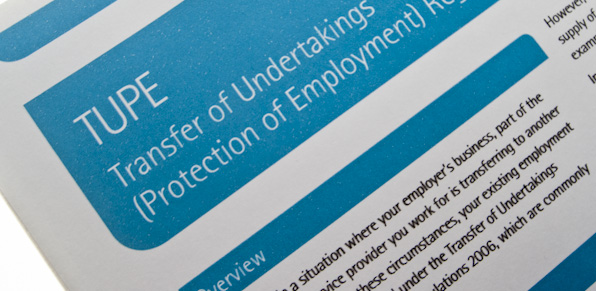How does current TUPE regulation affect your business?
How does current TUPE regulation affect your business?
TUPE (pronounced tu-pee) is a word that seems to cause a lot of confusion within the cleaning industry. Speaking to potential customers, they are often unclear as to what it means and the subsequent implications on them as a business.
What is TUPE?
Firstly, the current TUPE (Transfer of Undertakings and Protection of Employees) regulations apply to every industry. It is not exclusive to cleaning. TUPE is a piece of legislation that the Government brought in to protect the employee’s rights when a contract transfers from one company to another.
How does TUPE affect the cleaner?
The new contractor is obliged to offer the cleaner a position, under the same terms and conditions (including rate of pay) as the previous company. The cleaner is not obliged to transfer, in fact, they may have an option to work at another location, with their existing employer.
How does TUPE affect the customer?
If you’re happy with the cleaner but unhappy with the management service provided by your contractor, then TUPE will hugely benefit you. The new contractor will take on the management of your existing cleaner and the service should dramatically improve. Win/Win.
If however, you are changing contractors because of the poor cleaning service, then you might not be as thrilled with the idea. What then? The first thing to consider is that the cleaner may not be entirely to blame for the poor service. Very often it is the lack of management that is the problem – the cleaners are left to their own devices with no guidance, inspections or reviews. Sometimes, they don’t even realise they are doing a bad job.
That’s where the new contractor comes in – it is often simply a case of implementing some new quality control procedures and strong management skills. This might include re-training, regular check-ups and better channels of communication. We have regularly seen poor performing cleaners turned around as a result of revised management skills. The reluctant customer is often astounded at the difference, assuming that we have employed a new cleaner!
If the service provided by the cleaner is consistently poor despite sufficient training and supervision, disciplinary procedures will quickly be put in place and a replacement cleaner found as soon as possible.
Where the cleaner is currently employed directly by the customer (termed as in-house), the same rules apply – the contractor must offer the cleaner a position under the same terms and conditions. The only change will be that the contracted company is now responsible for providing all holiday cover, sick cover, management and training.
How does TUPE affect the contractor?
The contractor has no choice but to comply with current TUPE legislation. It is, therefore, vital that they consult with the current cleaning staff early on, to establish who will be transferring across. The rate of pay and holiday entitlement must remain the same, meaning that the cleaning company will have very little flexibility in terms of pricing a contract. The cost of labour is the main expense and this has to remain fixed.
Although this can make things difficult for a contractor who is wanting to be considered in a very competitive market, it should reassure the customer, that the monthly price is realistic. If you find an enormous discrepancy between quotes, it is worth questioning whether the contractor is complying with the legislation.
In short, if you’re looking to make a change, don’t let TUPE be a barrier to you. Good suppliers are used to dealing with this legislation and will make changes if the staff are unable or unwilling to deliver, even after quality training has been given. Good cleaners like working for good companies, a change of employer to one that provides good, local support will work for them


